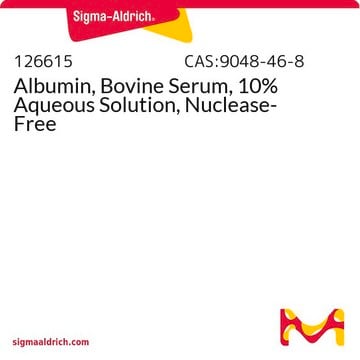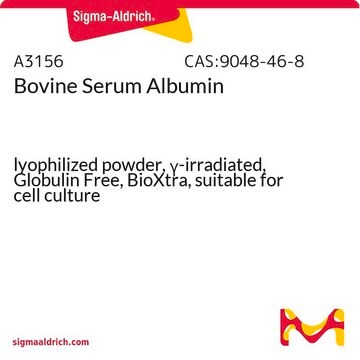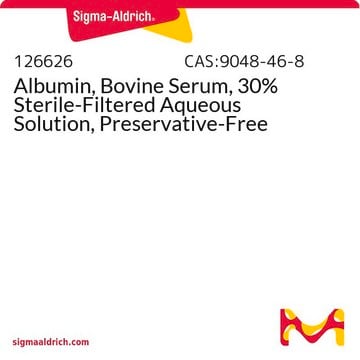A8412
Bovine Serum Albumin solution
7.5% in DPBS, sterile-filtered, BioXtra, suitable for cell culture
Synonym(s):
Albumin solution from bovine serum, BSA solution
About This Item
Recommended Products
biological source
bovine
Quality Level
description
low endotoxin
sterility
sterile-filtered
product line
BioXtra
Assay
7.0-8.0% protein basis (UV)
form
liquid
mol wt
66.4 kDa
purified by
cold ethanol and heatshock fractionation
origin
USA origin
concentration
7.5% in DPBS
technique(s)
cell culture | mammalian: suitable
impurities
≤13.0 EU/mL Endotoxin level
pH
6.5-7.5
foreign activity
Mycoplasma test (Negative)
cell growth >50%
shipped in
ambient
storage temp.
2-8°C
Looking for similar products? Visit Product Comparison Guide
General description
Application
Biochem/physiol Actions
related product
Storage Class Code
12 - Non Combustible Liquids
WGK
WGK 3
Flash Point(F)
Not applicable
Flash Point(C)
Not applicable
Personal Protective Equipment
Certificates of Analysis (COA)
Search for Certificates of Analysis (COA) by entering the products Lot/Batch Number. Lot and Batch Numbers can be found on a product’s label following the words ‘Lot’ or ‘Batch’.
Already Own This Product?
Find documentation for the products that you have recently purchased in the Document Library.
Customers Also Viewed
Articles
Explore serum albumin's role in serum-free cell culture systems for biomanufacturing.
Our team of scientists has experience in all areas of research including Life Science, Material Science, Chemical Synthesis, Chromatography, Analytical and many others.
Contact Technical Service








